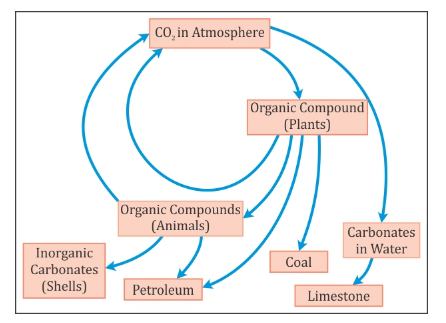carbon- cycle act in nature?
Carbon Cycle
- The carbon cycle is the biogeochemical cycle in which circulation and transformation of carbon occurs back and forth between the living things and the environment.
- Carbon is an important constituent found in all living organisms in the form of carbohydrates, proteins, fats and nucleic acids.
- Producers, i.e. plants, manufacture glucose which is a carbohydrate. Other animals are dependent on plants to obtain the organic constituents required to build carbohydrates, proteins and fats within the body.
- During respiration, all living organisms break down glucose to produce energy. During this process, carbon dioxide is released into the atmosphere.
- Some carbon is passed into fossil fuels from dead and buried organisms. When fossil fuels such as coal, peat and petrol are burnt, carbon dioxide is given out into the atmosphere.
- Volcanic eruptions also release carbon dioxide in the atmosphere.
- Some carbon gets incorporated into carbonate rocks. It is released during the process of erosion.
- Carbon is present in ocean water. It stays deep in the water. This carbon is brought on the surface along with ocean currents. From the ocean surface, it is released into the atmosphere.
- The percentage of carbon dioxide has doubled due to combustion of fossil fuels in factories and cars.
